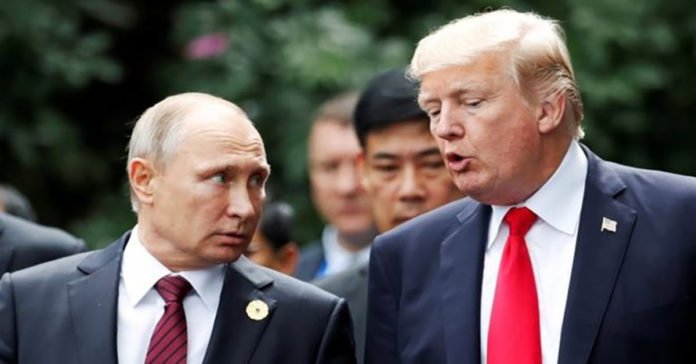
The US is out of the Intermediate-range Nuclear Force missile treaty with Russia.
Secretary of State Mike Pompeo says. The US immediately announced plans to start testing a new missile.
The United States formally withdrew from the landmark Intermediate-range Nuclear Force pact with Russia on Friday after determining that the Kremlin had violated the treaty and had no plans to come back into compliance with it. US officials also announced plans to test a new missile that would have been banned under the terms of the INF in the coming weeks.
“Russia is solely responsible for the treaty’s demise,” US Secretary of State Mike Pompeo said in a statement released early Friday. “The United States will not remain party to a treaty that is deliberately violated by Russia,” he added.
Signed in 1987 by US President Ronald Reagan and Soviet leader Mikhail Gorbachev, the accord banned land-based missiles with a range of 500-5,500 kilometers (300-3,300 miles) — those capable of reaching Russia from Western Europe and vice versa.
In February, the United States formally announced that it would withdraw from the pact after accusing Russia of developing weapons that violated the terms of the treaty. Russian officials responded by saying they would pull out, as well.
NATO joined the US in blaming Russia for the treaty’s demise. In a statement released Friday, the alliance announced that members would respond “in a measured and responsible way.” The NATO missive reproduced nearly exactly the US administration’s words: “Russia bears sole responsibility for the demise of the treaty.”
US officials say the treaty fell apart because of Russia’s Novator 9M729 missile. On Friday, the Kremlin, however, put the blame on the Americans. “On August 2, 2019, at the initiative of the US side, the treaty between the Soviet Union and the US on the elimination of their medium-range and shorter-range missiles … was terminated,” the Foreign Ministry announced.
Russian officials also called on the United States and its allies to not immediately engage in proliferation with the end of the deal. “We have suggested to the US and other NATO members to consider announcing a moratorium on the deployment of intermediate-range missiles,” Deputy Foreign Minister Sergei Ryabkov told the state-owned TASS news agency on Friday.
Donald Trump made the determination that the United States would terminate adherence to the INF, senior administration officials told reporters. The president also signaled that there was no urgency to the question of whether the United States would seek new diplomatic measures to prevent nuclear conflict.
‘And that’s OK’
“We’ll see what happens,” Trump told reporters at the White House on Thursday, hours before the agreement expired. “I will say Russia would like to do something on a nuclear treaty, and that’s OK with me. They’d like to do something, and so would I.”
It’s not just Trump and Russia who would like to see “something on a nuclear treaty” done. “With the end of the INF treaty, Europe is losing part of its security,” German Foreign Minister Heiko Maas said on Friday. “I am convinced that today we must again succeed in agreeing rules on disarmament and arms control in order to prevent a new nuclear arms race.”
This is a "Pay as You Feel" website Please help keep us Ad Free.
You can have access to all of our online work for free. However if you want to support what we do, you could make a small donation to help us keep writing. The choice is entirely yours.

























